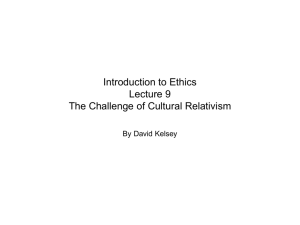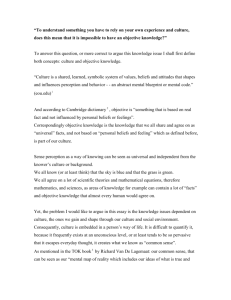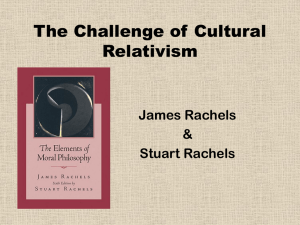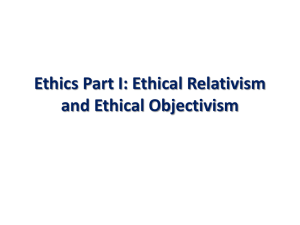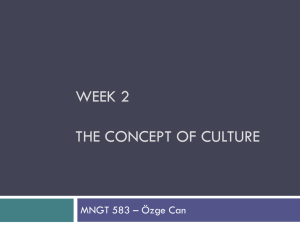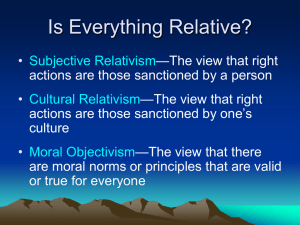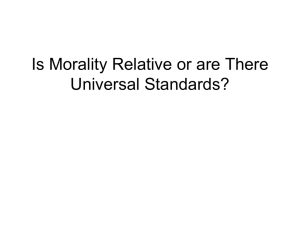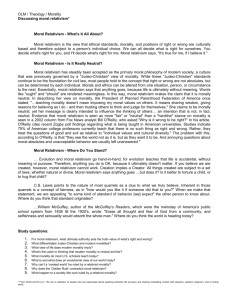Introduction to Ethics Lecture 9 The Challenge of Cultural Relativism
advertisement
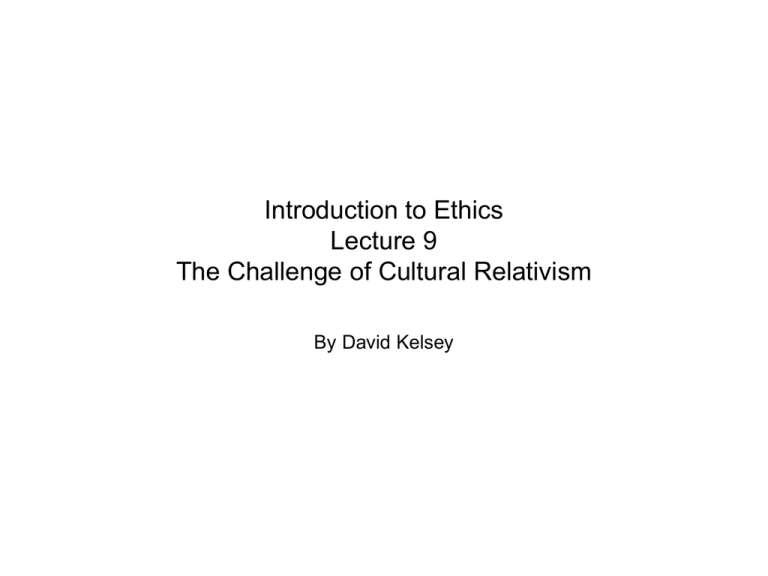
Introduction to Ethics Lecture 9 The Challenge of Cultural Relativism By David Kelsey What is Relativism? • Different ways of defining Cultural Relativism: – – – – – – 1. Different societies have different moral codes. 2. There is no objective standard that can be used to judge one societal code better than another. 3. The moral code of our own society has no special status; it is merely one among many. 4. There is no “universal truth” in ethics--that is, there are no moral truths that hold for all peoples at all times. 5. The moral code of a society determines what is right within that society; that is, if the moral code of a society says that a certain action is right, then that action is right, at least within that society. 6. It is mere arrogance for us to try to judge the conduct of other peoples. We should adopt an attitude of tolerance toward the practices of other cultures. The Cultural Differences Argument • The cultural differences argument: – – • 1. Different cultures have different moral codes. 2. Therefore, there is no objective “truth” in morality. Right and wrong are only matters of opinion, and opinions vary from culture to culture. Evidence for 1: – – – The Callatians: ate the dead The Greeks: cremation The Eskimo: Infanticide Arguments against Cultural Relativism: The Cultural Differences Argument isn’t valid • The argument isn’t valid: – – – – • If 1) is true this doesn’t guarantee that 2) is true. Although 1) is true 2) could still be false. The first premise concerns what people believe while the conclusion concerns what really is the case. There is no reason to think that if there is a moral truth everyone will know it. Reply: – – Is the argument meant to be deductive or inductive? The missing premise… Cultural Relativism and its implausible consequences • If Cultural Relativism were true: – 1. We could no longer say that the customs of other societies are morally inferior to our own. • You couldn’t criticize a society if it waged war on a neighbor for the purpose of taking slaves. – 2. We could decide whether actions are right or wrong just by consulting the standards of our society. • To find right action we must simply consult our societies moral code. • But then on this view we cannot even criticize our own societies moral code. • But is our societies moral code really perfect? Can’t we think of ways it can be improved? One final consequence of Relativism • 3. The idea of moral progress is called into doubt. – There is no independent standard by which to judge our moral code now compared to our moral code hundreds of years ago. Thus, neither code is better. – But haven’t some changes in our moral code been for the better? • Consider the rights of minority groups gained in this country… – But to say progress has occurred is to say things are better now. • But to call something better you need an independent standard of comparison… – And further, how do we explain Social Reform: • No progress in changing a societies ideals only in the case that the society isn’t living up to its ideals… There is less disagreement than it seems • What appears to be disagreement about value is reducible to disagreement of belief about fact. – Just ask why the apparent disagreement in value occurs and a factual disagreement appears. – Examples: • A culture in which people think it’s wrong to eat cows. – They do so because they think that after death the souls of humans inhabit the bodies of cows. • The Eskimo’s practice infanticide because drastic measures are needed to survive where they live. All Cultures have some values in common • Common values: – 1. All cultural groups must value protecting their infants. • 1. Human infants are helpless and cannot survive if they are not given extensive care for a period of years. • 2. Therefore, if a group did not care or its young, the young would not survive, and the older members of the group would not be replaced. After a while the group would die out. • 3. Therefore, any cultural group that continues to exist must care for its young. – 2. All cultural groups must value truth telling. • Communication in society would break down… All societies must prohibit murder • A 3rd value all societies have in common: • 3. All cultural groups must prohibit murder. – • Individuals would become self sufficient and society would break apart. Thus, there are some moral rules that all societies will have in common, because these rules are necessary for society to exist. What can be learned from Cultural Relativism? • What can we learn: – Many of our practices are merely peculiar (relative) to our society. • Many of our preferences are just social conventions. • Examples… – Keep an open mind • So just because we believe some action to be right doesn’t mean it is. • And just because someone else disagrees with something we believe or do, this doesn’t mean they are incorrect. Final Thoughts • Final Thoughts: – Any final thoughts on morality after we have considered Relativism? • Thoughts? – My thoughts: • Can we say morality consists of some concepts that are more relative than others?
